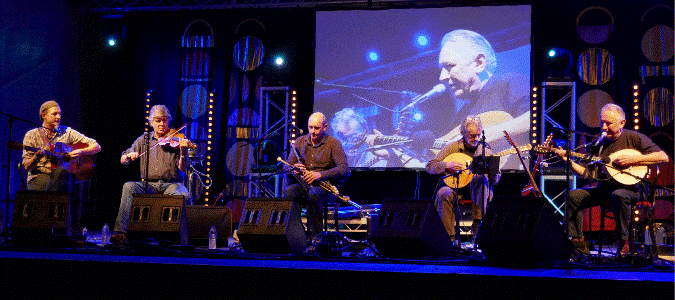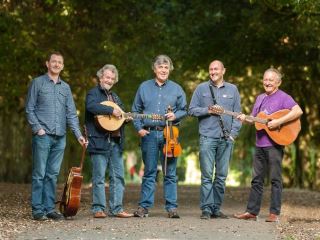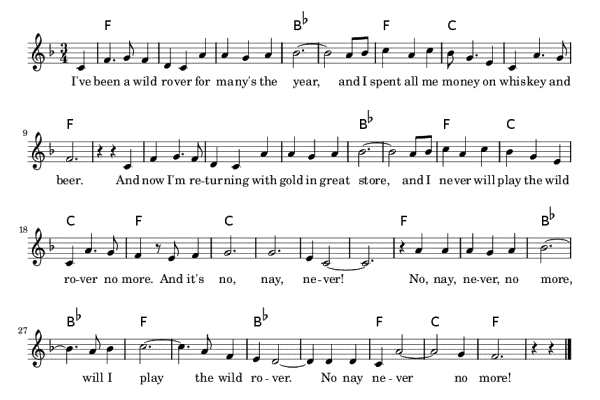

Songs That Made History: The Wild Rover (Roud 1173) is a popular English-language folk song whose origins are contested.

Historically, the song has been referred to in Irish folklore and, since the late sixteenth century, it has been noted in written records—although it is likely that some northern Atlantic fishing crews knew the song before these historical accounts were made.
The song is a staple for artists performing live music in Irish pubs. It is often considered to be a drinking song rather than a temperance song. For many people, the Wild Rover is the stereotypical Irish drinking song. In the twentieth century the location of the song became a major concern due to its popularity, spurring continued debate amongst several European nations.
"The Wild Rover" is the most widely performed Irish song, although its exact origins are unknown.


The song tells the story of a young man who has been away from his hometown for many years. Returning to his former alehouse the landlady refuses him credit, until he presents the gold which he has gained while he has been away. He sings of how his days of roving are over and he intends to return to his home and settle down.
According to Professor T. M. Devine in his book The Scottish Nation 1700 - 2000 (Penguin, 2001) the song was written as a temperance song. The song is found printed in a book, The American Songster, printed in the USA by W.A. Leary in 1845, and spread from Scotland to America from the Temperance movement. There is another USA printed version in the "Forget-Me-Not Songster" (c 1850), published by Locke. An alternative history of the song is suggested by the fact that a collection of ballads, dated between 1813 and 1838, is held in the Bodleian Library. The printer, Catnach, was based in the Seven Dials area of London. The Bodleian bundle contains "The Wild Rover". The Greig-Duncan collection contains no less than six versions of the song. It was compiled by Gavin Greig 1848–1917.
The song is number 1153 in the Roud Folk Song Index, which lists 200 versions, many of which are broadsides, in chapbooks or song collections. About 50 have been collected from traditional singers. Of these, 26 were collected in England, 12 in Scotland, 3 in Ireland, 5 in Australia, 4 in Canada and 2 in the USA. (These figures may reflect collecting effort and collectors' taste rather than the distribution of singers who knew the song).
WILD ROVING
I've played the wild rover for manys the year
and I spent all my money drinking strong ale and beer
but now for the future I will take better care
in case that misfortune shall come to my share
Dm C
Wild rovin' I'll give it over
Bb Dm
Wild rovin' give o'er
And I ne'er shall be called
The wild rover no more
I went into an alehouse where I used to resort
and I told the landlady my money it was short
and the answer that she gave me - well the answer was nae
such a custom as yours I can get anyday
I put my hand in my pocket my money for to find
and I drew out the full of my two hands five times
when she saw I had money and money galore
when she saw I had money - she called me her stór
then she said I have liquors and strong ales of the best
and the words that I told her were only in jest
My false-hearted landlady I might bid you adieu
and that you might be hanged without stockings or shoes
I'll go home to my father like the prodigal son
and it's there I'll confess all the wrongs that I've done
If I had all the money that I left in your care
it would till all my land and my family rare
it would thatch all my houses - it would build me a bawn
it would buy me a coat for to keep my back warm
 Watch Wild Roving from:
Linsey Aitken, Kentigern, Gabriella Lewis
ABC Format:
X:1
T:Wild roving no more
M:3/4
Q:1/4=100
K:F
D5E|F3A,A,2|C2D2E2|F2A3G|A4FG|A2d2c2|AG3A2|
F2D2EF|D4E2|F3A,A,2|C2D2E2|F2A3G|A4FG|A2d2c2|
A3GA2|F2D2EF|D4E2|F3A,A,A,|C2D3E|F2A2GA|A4FG|
A2d2c2|AG3AG|F2D2EF|D6||
Watch Wild Roving from:
Linsey Aitken, Kentigern, Gabriella Lewis
ABC Format:
X:1
T:Wild roving no more
M:3/4
Q:1/4=100
K:F
D5E|F3A,A,2|C2D2E2|F2A3G|A4FG|A2d2c2|AG3A2|
F2D2EF|D4E2|F3A,A,2|C2D2E2|F2A3G|A4FG|A2d2c2|
A3GA2|F2D2EF|D4E2|F3A,A,A,|C2D3E|F2A2GA|A4FG|
A2d2c2|AG3AG|F2D2EF|D6||
Raymond Daly and Derek Warfield of The Wolfe Tones describe how the fans of Celtic Football Club in Scotland sing The Wild Rover at away matches. The chorus is well known throughout most Irish, Irish-American and British cultures, even among people who have no knowledge of the rest of the song.
As with Celtic Football Club, the chorus is sung by football fans throughout England, usually with the words adapted to suit the team in question.
Many companies have also taken advantage of the tune's popularity and used it to advertise their products. Dairy Crest adapted the chorus to advertise their Clover margarine in the UK.
Many popular singers and bands have covered the song, including:
 |
THE WILD ROVER I've been a wild rover for many's the year I've spent all me money on whiskey and beer But now I'm returning with gold in great store And I never will play the wild rover no more And it's no, nay, never No, nay, never, no more Will I play the wild rover No never no more I went in to an alehouse I used to frequent And I told the landlady me money was spent I asked her for credit, she answered me "nay Such a customer as you I can have any day" I took up from my pocket ten souvereigns bright And the landlady's eyes opened wide with delight She says "I have whiskeys and wines of the best And the words that you told me were only in jest" I'll go home to my parents, confess what I've done and I'll ask them to pardon their prodigal son And when they've caressed me as oft times before I never will play the wild rover no more |

Text is available under the Creative Commons Attribution-ShareAlike License.
Date: October 2017.
Photo Credits:
(1),(4) Usher's Island,
(2) The Dubliners,
(3) Julia Bishop, Steve Roud "The New Penguin Book of English Folk Songs",
(5) "The Wild Rover"
(unknown/website).